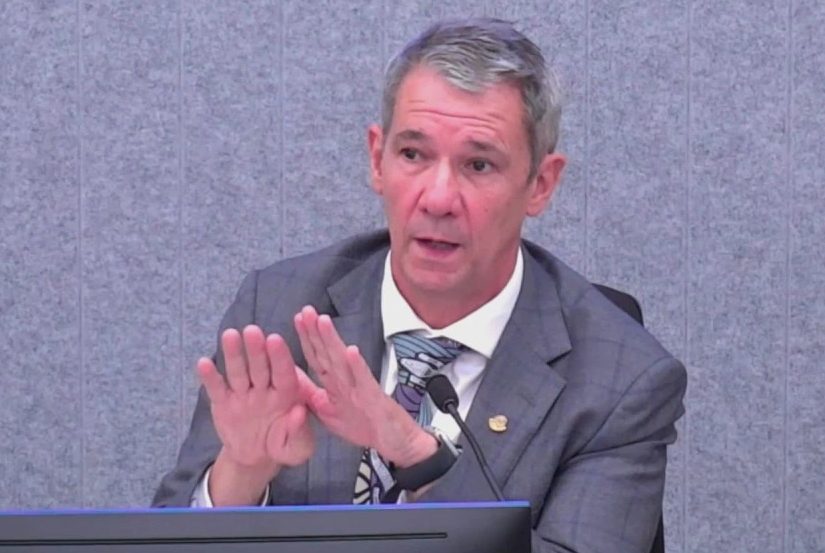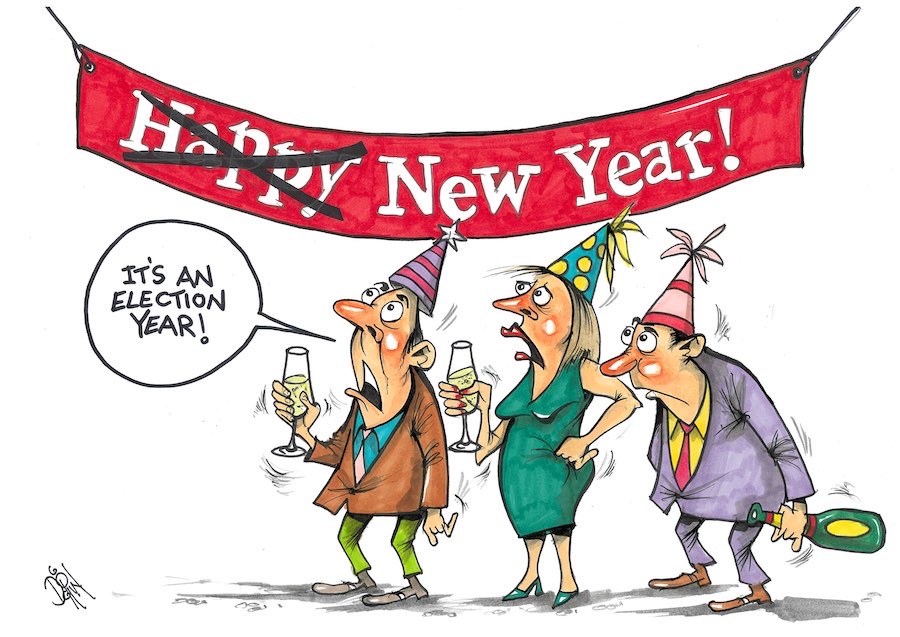
The former ACT Director of Public Prosecutions sought to restore his reputation with litigation that has proved pointless at best. Indeed, for Mr Drumgold it has been worse: the negative labels have been hung up again – at his instigation, says legal columnist HUGH SELBY.
Former ACT Director of Public Prosecutions Shane Drumgold sought to restore his reputation by first showing that a reasonable non-lawyer observer would have “an apprehension of bias” by Commissioner Walter Sofronoff KC.

This successful claim was based upon the multiple “exclusive” communications between journalist Janet Albrechtsen (who had repeatedly expressed in her articles negative views about Mr Drumgold) and the commissioner.
The problem for Mr Drumgold was that he then had to demonstrate that the commissioner’s negative findings about Mr Drumgold were legally “unreasonable”.
Mr Drumgold drew attention to eight such findings. He succeeded on only one, leaving seven in place.
Litigation lawyers and law students can be grateful for Justice Stephen Kaye’s exposition of the law and how to apply it to facts. But for everyone else, including Mr Drumgold, this litigation has been pointless at best. Indeed, for Mr Drumgold it has been worse: the negative labels have been hung up again – at his instigation.
That has made him a fresh target for Ms Albrechtsen who has roundly condemned his being employed by the University of Canberra to teach evidence to law students (The Australian, March 5). The article is vicious, nasty and reminds me of kicking a person when they’re down.
His litigation faults that led to his necessary resignation as DPP do not disqualify him from teaching law, especially a subject such as evidence that is so practical, rather than layers of principles.
He may be an excellent teacher, able to illustrate important points by examples drawn from his own experience. Learning from errors is valuable. Let us hope that his teaching aptitude today, not his past limitations, remains the test for his continued employment. He needs a job. He needs to rebuild. He needs the chance.
Albrechtsen might like to reflect, too
Ms Albrechtsen, too, might like to reflect on her contribution to this mess. Did it never occur to her that a line may have been crossed in her near “exclusive” access to the commissioner? From her articles she has ready access to many experienced lawyers who might have been asked.
We know that she had an embargoed copy of the Inquiry Report. The ABC and one other “interest” also received embargoed copies.
Despite the “trust” between her and the commissioner she obtained another copy and all bets were off.
The Australian went to press with its exclusive, with no regard for protocol, or the mutuality of obligation between Ms Albrechtsen and the commissioner.
“Exclusivity” (hidden behind a bare claim of “we got another copy, but don’t ask us how”) trumped all collateral damage. Not self-evidently commendable.
Those eight findings
Mr Drumgold sought to have these findings declared to be legally unreasonable (set out in para 355 of the judgment):
- The finding to the effect that, having read counselling notes [about] Ms Higgins, [Mr Drumgold’s] prosecutorial duty of disclosure [to the defence] had been engaged, and his failure to do anything in respect of it [that duty] was a breach of his duty as prosecutor.
Mr Drumgold failed. It was not unreasonable for the commissioner to conclude that his failure to do anything about the counselling notes which he had read, when he had several options, was a breach of his duty as a prosecutor.
- The finding that [Mr Drumgold’s] determination, during the proceeding, that certain documents generated by the ACT police were not disclosable [to the defence], was wrong and untenable.
Mr Drumgold failed. The analysis in the Report demonstrated that the bases upon which he had resisted disclosure of the documents were clearly flawed.
Justice Kaye considered findings #3, #4 and #5 as a group:
- The finding that [Mr Drumgold] deliberately advanced a false claim of legal professional privilege in respect of certain documents provided [to his office] by ACT police, based in part on the findings by the [commissioner], that a determination that those documents were protected could not honestly be formed by a competent lawyer.
- In respect of an affidavit, deposed by a junior lawyer within the Office of the Director of Public Prosecutions, supporting the position that certain documents were protected by legal professional privilege, the finding that [Mr Drumgold] asked a solicitor to swear a misleading affidavit and, when “foiled”, he directed a junior lawyer in his office to make a misleading affidavit, and, in doing so, he “preyed” on the junior lawyer’s inexperience, egregiously abused his authority and betrayed the trust of his young staff member.
- The finding that [Mr Drumgold] misled the court in respect of the claim of legal professional privilege, and tried to use dishonest means to prevent a person, whom he was prosecuting, from lawfully obtaining relevant material.
With respect to #3 and #5 Justice Kaye found: “None of the matters, advanced on behalf of [Mr Drumgold], demonstrate that any of the intermediate conclusions, on which the [Commissioner] relied in the report, were erroneous or legally unreasonable. Those intermediate conclusions were a sufficient and reasonable basis for the critical conclusion, by the [commissioner], that [Mr Drumgold] constructed a false narrative to support a claim of legal professional privilege. That conclusion in turn was the essential basis of the third finding.
“Further, it was based on that false narrative that [Mr Drumgold] at the hearings on both 12 September and 16 September 2022, represented to the chief justice that the documents were privileged, because they had been created for the purpose of obtaining his advice. It follows, that the fifth finding… that [Mr Drumgold] misled the court in respect of the claim of legal professional privilege, could not be impugned on the basis of legal unreasonableness. [para 445]
With respect to #4 Justice Kaye found: “…it could not be maintained that it was legally unreasonable for the [commissioner] to conclude… that [Mr Drumgold], having asked a solicitor to swear a misleading affidavit and, having been ‘foiled’ in that respect, ‘preyed’ on the inexperience of a junior lawyer and, in doing so, ‘egregiously’ abused his authority and betrayed the trust of that staff member, by procuring him to swear a misleading affidavit, which in fact deposed to a false narrative supported by [Mr Drumgold].” [para 451]
- The finding that [Mr Drumgold] made false statements and knowingly lied to the court in respect of the contemporaneity and authorship of the conference note relating to the proofing of the journalist, Lisa Wilkinson.
Justice Kaye’s finding is damning: “[Mr Drumgold], as a senior and experienced member of counsel, holding an important public office, could reasonably be considered to be well aware of the importance of his duty of candour with the court. The short time between the preparation of the briefing note and [his] mis-statement to the court, and the fact that that topic was of particular relevance to the chief justice, were relevant and valid considerations in the conclusion by the [commissioner] that the misstatement by [Mr Drumgold] about the note, was not a product of error.” [para 462]
- The finding that, in respect of the disclosure by Ms Wilkinson of the nature of a speech she might give in the event she won an award, [Mr Drumgold] was under a duty to warn her not to give the speech, and, if necessary, to seek an injunction preventing the speech, and that he had failed to do so.
Justice Kaye found: “…there was no legal unreasonableness in the finding by the [commissioner], that [Mr Drumgold] had a duty to warn Ms Wilkinson not to give the speech in the form in which she had read to him, and in the finding that [Mr Drumgold] had failed to give such advice to Ms Wilkinson.” [para 478]
- The finding that [Mr Drumgold] had engaged in “grossly unethical” conduct, by making suggestions, in his cross-examination of Senator Linda Reynolds, that had no basis at all and should not have been made.
Justice Kaye found for Mr Drumgold on this finding. He reviewed the law as to cross-examination. He noted: “The critical issue… is whether it was legally unreasonable for the [commissioner] to conclude that the facts and circumstances in the possession of [Mr Drumgold], on which the four propositions [in questions put by Mr Drumgold to Senator Reynolds] were based, constituted ‘no basis at all’ for those propositions.” [para 501]
Later he pointed out: “Certainly, it may be accepted that reasonable minds might fairly disagree whether the matters, to which I have referred, were a sufficient basis for [Mr Drumgold] to advance the propositions in cross-examination, in the manner in which [he] did so. However, taking into account the matters to which I have referred, I do not consider that it could be reasonably concluded that [Mr Drumgold] had ‘no basis at all’ to put those propositions to Senator Reynolds.” [para 510]
Natural justice
Mr Drumgold had a further argument to make in his quest to have the inquiry findings declared to be legally unreasonable. He alleged that he was not given “natural justice”.
There were three findings that he challenged. He lost on two, won on one. It would give him no comfort, especially given the aggregated weight of his failings.
All in all a sorry tale, with nothing to lighten it.
Former barrister Hugh Selby’s free podcasts on “Witness Essentials” and “Advocacy in court: preparation and performance” can be heard on the best known podcast sites.
Who can be trusted?
In a world of spin and confusion, there’s never been a more important time to support independent journalism in Canberra.
If you trust our work online and want to enforce the power of independent voices, I invite you to make a small contribution.
Every dollar of support is invested back into our journalism to help keep citynews.com.au strong and free.
Thank you,
Ian Meikle, editor




![Canberra’s woodchopping association – the Hall and District Axemen’s Club – is rebranding to Capital Country Woodchopping.
“We didn’t want to be exclusively a Canberra association and we deliberately left any gender-specific wording out in the new name,” says president Cheyanne Girvan, 32.
“We also went a different [way] to other associations under NSW by not including ‘association’ in our name.”
Four years ago the Hall and District Axemen’s club’s membership was 25.
Cheyanne says this name change will give the club the versatility to grow into other areas and on to greater things.
To read on about Cheyanne's story with the woodchoppers, visit our website at citynews.com.au or click the link in our bio!
@@capitalcountrywoodchopping
#woodchopping #woodchoppinggirl #woodchoppingaustralia #axemen #axewomen #woodcutter #canberrastories #storiesthatmatter #citynews #journalism](https://citynews.com.au/wp-content/plugins/instagram-feed/img/placeholder.png)
Leave a Reply